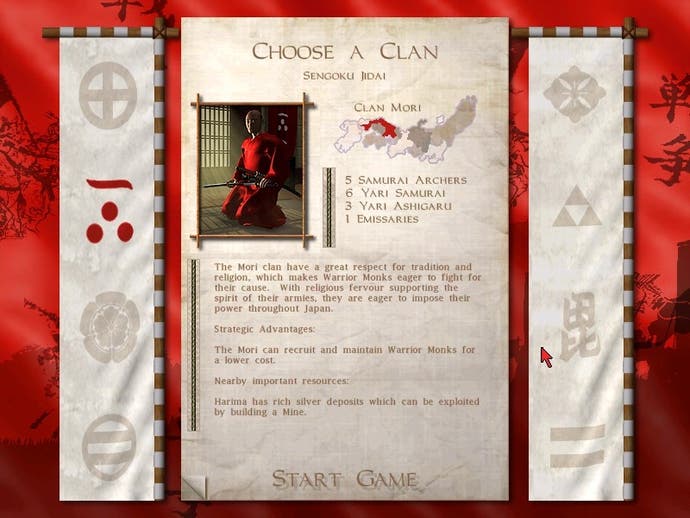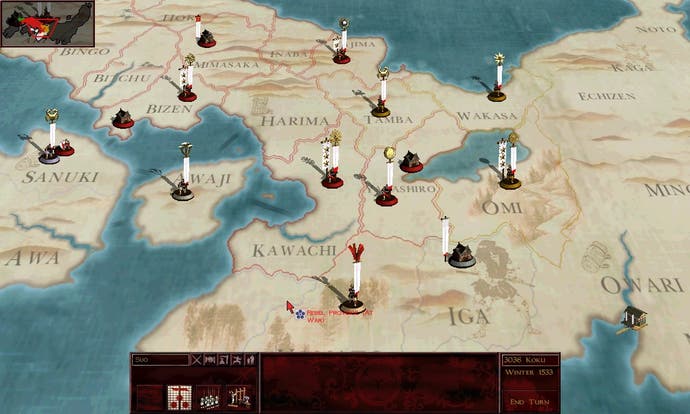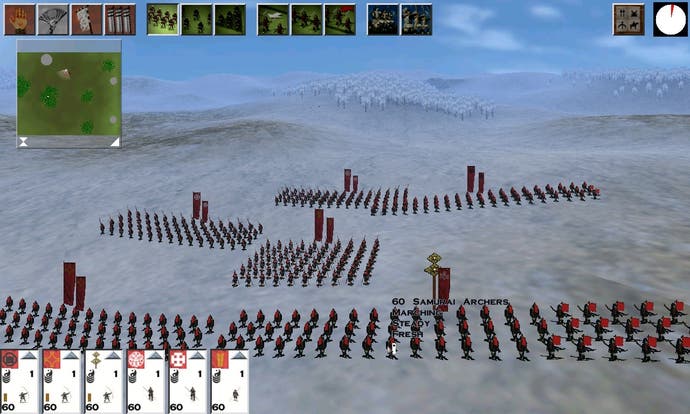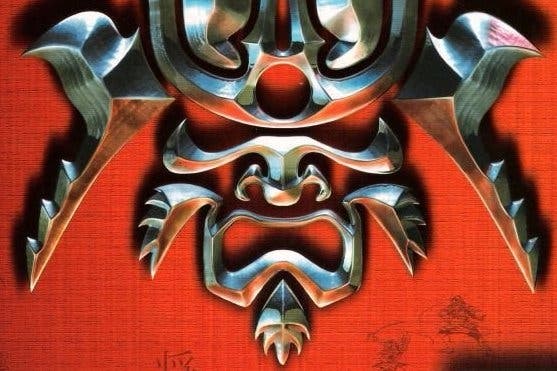Shogun: Total War and the art of a great video game story
Daim of Yos.
Do you remember the first time a video game told you a story? By that I don't mean the first time you played a video game that had a story. I mean the first time it made one up for you, like a grandmother who's reached the end of her book of fairytales, but the grandchildren are crying "One more, one more!". I mean the first time a game took a bunch of random numbers, fed them through a system of switches and levers, and somehow outputted a coherent, mesmerising narrative? Do you remember the first time you experienced this magical moment that only games can provide?
I do.
It was 2003, and the game was Shogun: Total War. I'd picked it up a couple of years prior and played with it a little. I'd gone "wow" at its ability to render hundreds, sometimes thousands of tiny soldiers on impressive 3D terrain, then forgotten about it in favour of the new Medal of Honor or something. I'd never been much of a strategy guy. Up to that point, the only strategy game that had held my attention for longer than a few hours was Age of Empires, because of its elegant simplicity and that compulsive rhythm of advancing your civilisation.
Then a few years later something prompted me to pick it up again. Possibly because I also picked up Medieval: Total War and found the increased scope to be intimidating, so I figured I'd ease myself in by returning to Shogun first. Anyway, this time I got really into it. It was the ninjas that did it, the ability to decapitate an opposing army with a single man was delectably dastardly, and I loved those open-ended cutscenes that managed to combine surprising tension and slapstick comedy within ten-second vignettes.

Shogun was the first game that introduced "Strategy" as a meaningful word to me. Prior to that strategy was a vague and simplistic notion like "build more units than your opponent", or "research the right technologies." But Shogun made this abstract concept tangible. It meant that, if I placed my small force of cavalry archers on a hill, then their much larger force of Warrior Monks and Naginata Samurai didn't stand a chance. It meant that, if I moved all my forces into this rebel province, then I could take their castle, but I'd leave my current province vulnerable to being stolen by a chancing Daimyo. It meant that I only received income during the autumn rice harvest, and so needed to make that last across the entire year. It no longer meant "more" or "better", but making little decisions that caused big differences.
For this particular campaign, I was playing as the Mori clan, who I'd chosen for two very important reasons. Firstly, their faction colour was red, and red is my favourite colour. Secondly, they could recruit Warrior Monks on the cheap, and Warrior Monks are Really Cool.
Shogun painted its battles in fairly broad, rock paper scissors strokes. But I liked that, it meant you could recognise a problem on the battlefield and attempt to address it quickly. I preferred defending to attacking, because I could arrange my formations more specifically and attacking was generally costlier. I particularly hated attacking on a map where there was a bridge, because the enemy AI would always camp just beyond the range of my archers on the far side of the bridge, forcing me to try to push my own army across that narrow strip of wood, which inevitably resulted in heavy casualties.
For hours upon hours I fought and schemed, constructed castles, improved my farmland, trained ninjas and, towards the end, the ridiculously powerful Geisha units. I dabbled with guns but focussed mainly on heavy cavalry and my lovely, lovely warrior monks. And after many seasons had passed, the islands of Japan were split almost directly down the middle by just two clans. The south was held by my mighty Mori, and the North controlled by the fearsome Hojo clan. In the heart of Japan we waged a gruelling war of attrition, and it was a war that I was slowly losing.

I remember feeling genuinely quite upset about this. I'd sunk a lot of time into this stupid game, only to be defeated at the final hurdle. It wasn't like I was going down in blaze of glory either. Instead my resistance was slowly being eroded by the Hojo's seemingly infinite ability to produce units. Like I said, I enjoyed defending, and was perfectly capable of pulling apart an attacking force considerably larger than my own. But every time I sent one of their massive armies crying back to their Daimyo, two more vast legions would emerge from the fog of war like the heads of a hydra.
There was simply no way I could maintain the same level of unit production. Gradually, I was beginning to bleed provinces, the heels of my soldiers churning the mud as they were driven inexorably backwards, and the resulting loss of funds from those provinces was only worsening the situation.
It was utterly infuriating. I was quite clearly tactically superior, but their strength was simply overwhelming. And there was nothing I could do to shift the balance of power. It was only going one way, the Hojo's way. I was tempted to spite the damned AI by leaving the game hanging, and I think I may have done for several days. But I rarely finish strategy games, and for some reason I stubbornly determined to see this one through to the end, whatever the result.
Then something happened. Something so incredible that I still struggle to believe it to this day. Yet another innumerable Hojo army rocked up at my doorstep, poised to strike the killing blow to my ailing hopes. But this one was controlled by the Hojo Daimyo himself. What's more, a frantic check of the Hojo family tree revealed that their Daimyo had no viable heirs - the feudal equivalent of not backing up your hard drive. If the Hojo Daimyo died, his clan would die with him.
It was a perfect set-up, the arrogant leader of the enemy, spying victory within reach, steps from behind the ranks of his army to claim some of the glory for himself. For me it was a ray of hope, one last chance to seize the day. The game was well and truly afoot as the battle-lines were drawn.
I had plenty of men to fill the field, but the Hojo force was so huge that it could reinforce its entire army twice over. All those numbers counted for nothing, though, because I only had to kill one man. The fight took place on a wide, flat field, which is unusual in Japan's mountainous landscape, and I think it might have been raining. My strategy was straightforward enough, use my archers and footsoldiers to hold off the enemy forces as long as could, while my heavy cavalry focussed on singling out the Hojo's Daimyo.

I only recall snippets of the battle itself, probably because I was so focussed on the moment. A wave of Hojo troops crashed against my defensive wall, and while they were preoccupied, I sent two banners of heavy cavalry around the flanks to attack the Daimyo, who was holding back just behind the crush. They crashed into him like the jaws of a vice, and I knew I had him.
But then the bastard ran away!
I couldn't believe it. The dishonourable rat! I soon realised he wasn't fleeing the field, but running toward his reinforcements which had just arrived at the battle, for all intents and purposes a second army. My cavalry were still hot on his heels, haranguing him all the way. But Daimyos are tough to kill, requiring a lot of whittling down. It's hard enough to do when they're stood still, let alone galloping away from your forces. I knew that if he reached those reinforcements, the battle was all but lost. But there was nothing more I could do except watch, and wait, and hope.
Then, the magical words.
"The enemy Daimyo has fallen!"
Joy. Rapture. Ecstasy. The Hojo army shattered. It was like that moment in the Return of the King, when the tower of Barad-Dur collapses and the resulting shockwave crumbles the very ground beneath Sauron's forces. I chased the Hojo off the field, laughing as my cavalry cut down the retreating soldiers, merciless in my triumph (the scribes would later edit this bit out of the legend). Then Jeff van Dyck's delightful victory ditty rang out, and when the game returned to the campaign screen, the former Hojo clan had been transformed into a whitewash of scattered ronin armies and rebel provinces. I still had to pick the bones before my campaign would be truly complete, but at this point the job was done, the road to the Shogunate clear.
The original Shogun remains a great game, sporting a rare and exquisite balance of accessibility and depth. It has undoubtedly been eclipsed by The Creative Assembly's iterations on the formula, particularly its direct sequel Shogun II, still the high-point of the series. But the reason Shogun remains a great game for me is because of that particular battle, that particular campaign, that particular story. It crystallised in my mind the power of games as storytelling engines, their ability to not merely exist as creative works, but author them as well.
So I ask again. Do you remember the first time a video game told you a story?



